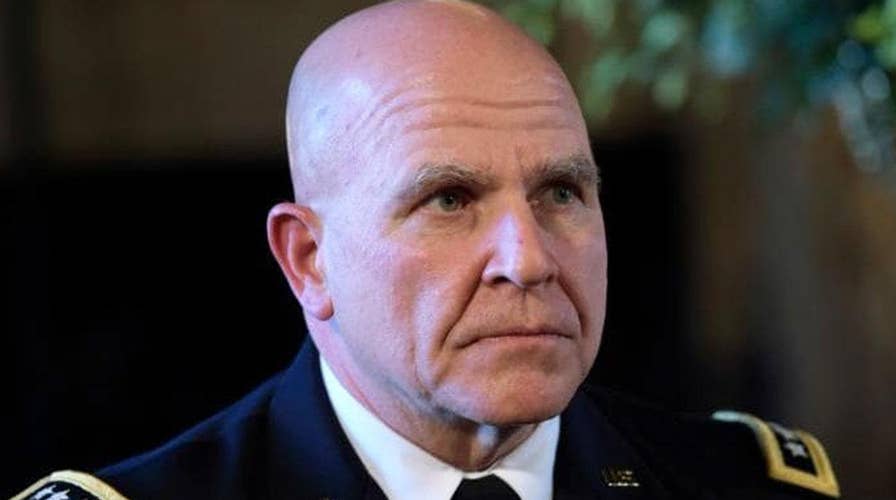McMaster on thin ice with the White House?
President Trump reportedly growing frustrated with national security adviser; Lt. Col. Michael Waltz weighs in on 'The Story'
H.R. McMaster is not the enemy. He is a loyal member of President Trump’s cabinet. But you might not know that from the attacks the National Security Adviser is taking from the right. There are some issues where I have concerns myself, but there is no reason to question his patriotism or whether he will faithfully execute the orders he is given. He has spent his entire adult life proving he will fight for this country.
President Trump faces a major challenge in dealing with both the populist uprising that launched him into the White House and the more establishment members of the right. The current unhappiness with McMaster is a symptom of this problem, but not the problem itself. If this rift gets much deeper it will leave the president without a governing coalition.
That helps only our enemies and the political left who don’t want any of the agenda that won Donald Trump the election to be implemented. President Trump backed McMaster publicly in the midst of all the uproar, so in the interest of winning, let’s get on the same team here.
McMaster has been accused of not properly evaluating the depth and breadth of the Islamist threat worldwide. He has often said that speaking about “radical Islamic terrorism” is not useful and that terrorists are “un-Islamic.” That tracks more closely with President Obama’s views than those of his current boss. I have heard a number of people in the national security community say he does not grasp the danger of the ideology that motivates our enemies.
But I had the chance in a closed setting with McMaster and a few others to dig a little deeper. His views on the danger posed by the Islamists is well grounded and during the discussion he said, "We must stop funding to all the radical Islamist groups and not just the violent ones, but also the ones who fund the extremist ideologies like Salafism and Qutbism—including some of the Muslim Brotherhood affiliates."
The reference to Salafism and Sayyid Qutb, one of the architects of Islamist philosophy for the Muslim Brotherhood, shows he sees the true danger of this ideology. Stopping funding for it must be as high a priority as taking down the terror groups like ISIS and al Qaeda. There is broad support among Muslims worldwide for Islamist domination. A Pew poll shows 72 percent in the largest Muslim country, Indonesia, want Islamic law and 50 percent say it should apply to even non-Muslims. The poll shows these beliefs are echoed across the Muslim population in most other countries as well.
Another area of concern pertaining to McMaster is the Iran Deal. The National Security Adviser joined other top cabinet officials arguing to certify Iran’s compliance, although the president has made it quite clear he wants the deal gone. McMaster believes Iran poses a threat with its nuclear aspirations and also in the many regional conflicts such as Iraq/Syria and Yemen and wants to put other pressures on them. But absent a provable material breach of the deal, he prefers to continue the current path until evidence of non-compliance is unearthed.
In a recent interview with radio host Hugh Hewitt he said this:
“And all of our, all the signatories to this have to be clear that, ‘If you violate the agreement, then there– there are gonna be consequences. And– and we can’t adhere to an agreement if the main party here, Iran, is violating it.’”
He also seems to be quite attuned to the president’s concerns regarding North Korea. In the same interview he said:
Hewitt: So that would mean, back to the preemptive strike or some kind of action against Kim Jong Un, should he be sleeping easily at night?
McMaster: No, I think– I think he should not be, because he– he has the whole world against him.”
He further explained that enough talking had been done and it was time for action, either sanctions capable of taking the regime’s nuclear saber-rattling out of play, or a military response. And he said there are plans for doing just that in a way that minimized the potential damage to South Korea. Good. There is a near zero chance Kim Jong Un will stop unless he believes continuing would be catastrophic for his regime.
McMaster also seems to have a solid mistrust for both Russia and China, which is vital given their power and overall status as global foes.
The bottom line is that H.R. McMaster is an asset to President Trump and will give him advice based on his experience and assessments. But when it is time to take action, he will implement the president’s policies. That is exactly what the country needs.









































